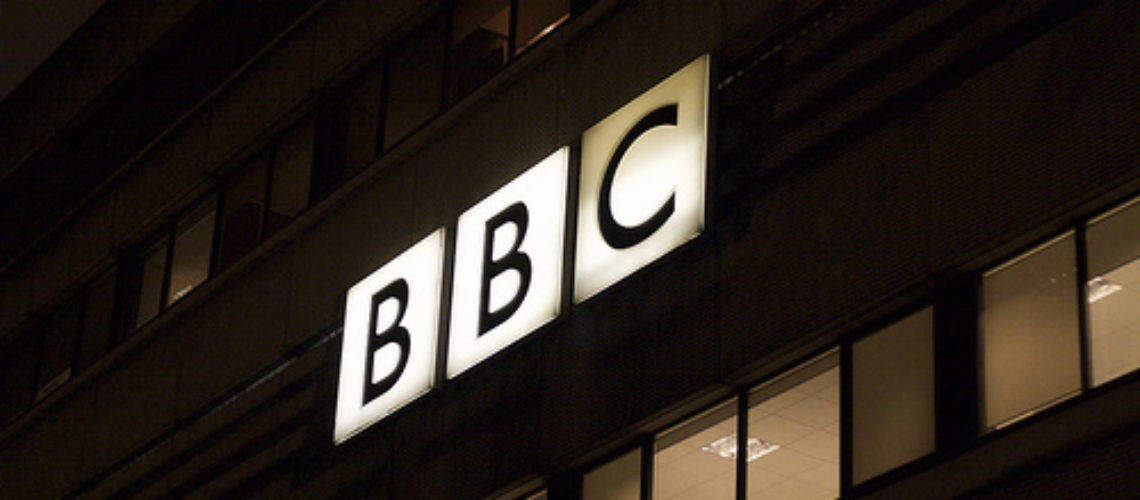Tim Davie, the BBC director general, has been in his post for six months, and on Thursday he delivered to staff his second raft of big ideas for reform.
His first proposal, in his first week of office in September, was to make BBC impartiality his number one priority, with a crackdown on biased tweeting by staff.
How’s that commitment going?
Well, hours after his latest staff speech was delivered last week, BBC Breakfast presenter Naga Munchetty and her male sidekick, Charlie Stayt, were hauled over the coals by Corporation top brass and ‘reminded of BBC impartiality rules’.
In the scale of PR cock-ups, that was a pretty spectacular own goal. Davie claimed in his staff speech that BBC news was doing ‘an outstanding job delivering impartial output’; hours later, two high-profile presenters were sniggering and sneering like schoolchildren about the idea of a government minister being patriotic by having a Union Jack in his office.
That said, was there anything in Davie’s speech which gave hope that he was intent on improving BBC output and had the vision and drive to deliver it?
Don’t bank on it. The first half of his message was marked by smug complacency. According to the director general, BBC news is brilliant, programmes are spectacularly good, and audiences are soaring.
He evidenced this by quoting a raft of disconnected figures: BBC overall audience reach is 90 per cent; BBC news reaches 86 per cent (up from 81 per cent a year ago); overall BBC viewing is up 8 per cent in both January and February.
Davie carefully avoided quoting other audience research, for example showing that the BBC’s Christmas television audiences were at an all-time low (and reached less than 10 per cent of the population) despite the lockdown, and that less than half the population don’t trust BBC journalists to tell the truth.
He did not mention that viewing of BBC television is in steep decline with all BBC services now attracting only a total of 31 per cent audience share.
Put another way, despite the BBC’s £3.5billion licence fee income – more by miles than any other media company in the UK – its audience share is now only three times that for Sky or Viacom (which owns Channel 5).
Seemingly undaunted by this, Davie said he was cutting jobs to make running of the Corporation more efficient, with 900 fewer people now employed, and bureaucracy ‘stripped away’. Paperwork, he claimed, had been cut by over 30 per cent.
Another trumpeted step forward is in ‘diversity’. Despite his claim of reduced paperwork and less bureaucracy, Mr Davie said that every department now had specific targets to reach employment levels of 50 per cent women, 20 per cent ethnic minority and 12 per cent of mentally or physically disadvantaged individuals.
Also targeted is ‘sustainability’. Davie said the Corporation’s ‘clear and strong’ position on this is that ‘a 2030 net-zero target’ has now been set. What this means is as clear as mud, but almost certainly involves a blizzard of bureaucratic effort. Ditto ‘diversity’.
Davie made a point of adding that ‘the over-75s licence fee policy’ had been ‘implemented professionally’ and was ahead of targets. What he meant, of course, was that despite fierce opposition, the BBC is forcing the age group which contains the most lonely, poor and vulnerable section of the population to pay to receive BBC services and that pensioners are subject to prosecution by the ‘door-to-door salesmen’ who enforce licence fee payment.
The alleged meat of his speech was that over the next six years the corporation will shift its ‘journalistic and creative centre away from London’. This, claimed Davie, will create an ‘economic benefit’ for the regions of £850million, provide a dramatic jobs boost ‘and improve representation on and off screen’.
Looking at the small print – and trying to convert his gobbledygook into something comprehensible – it means that, for example, the Today programme is going to come from outside London at least 100 times a year; Newsbeat will be produced in Birmingham; 60 per cent of programmes will be made outside London; a team of 100 ‘digital journalists’ will be deployed across the UK outside London; and two ‘long-running drama series’ will be made outside London.
Davie claims that this will be ‘the biggest transformation of the BBC in decades’.
Will it? The BBC’s main problem is still that it is riddled with bias, obsessed by ‘woke’ virtue-signalling, and has a complaints process which is risibly stacked in the BBC’s favour, existing to defend the corporation rather than to address the concerns of audiences. The Salford Quays development, which a decade ago was meant to signal a major shift by the corporation away from London bias, is every bit as much a woke media bubble as the London operation.
In prioritising drives towards ‘diversity’ and ‘sustainability’, and by being disingenuous about the massive fall in audiences and trust, Davie showed he is not addressing the real problems of the BBC but further encouraging the metro mindset on which it is based. The Davie ‘transformation’ is little more than crude window-dressing.

